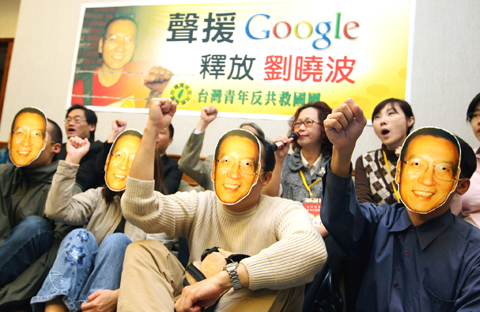Both Google’s threat to withdraw from the Chinese market and the reaction of Western countries to the heavy sentence handed down to Chinese dissident Liu Xiaobo (劉曉波) may be signs that the honeymoon period between the West and China has ended, Chinese democracy activist Wang Dan (王丹) said yesterday.
Wang made the remarks at a press conference held in Taipei attended by a number of political activists voicing their support for Google and for Liu.
“Western governments’ reactions to Liu’s sentence and the Google incident show that the honeymoon period between the West and China has come to an end,” Wang said. “In the past, Western countries looked only at the economic interests that the Chinese market represents and pretended that they didn’t see the Chinese government’s violations of human rights.”

PHOTO: CNA
He said Western enterprises may have thought they could avoid political intervention by the Chinese government if they stayed away from sensitive issues, but that is apparently not the case.
“You may try hard not to get involved in politics, but politics in China involve you,” Wang said.
The host of a radio political commentary show, Yang Hui-ju (楊蕙如), shared Wang’s views.
Citing the example of how online social networking service Plurk was blocked last year, Yang said: “Even if you do not provoke China, China may sanction you just because they don’t like something you say.”
Plurk was blocked in China last year because many Taiwanese joined a movement on the site to commemorate the 20th anniversary of the death of Taiwanese democracy pioneer Deng Nan-jung (鄭南榕), Yang said.
Several other online social networking services, such as Facebook and Twitter, have been blocked in China temporarily or permanently to prevent the spread of certain information.
Wang predicted that the Chinese government would eventually lose the Internet battle, “since the Internet has become an essential part of so many people’s lives nowadays, so you can’t really control it.”
“I believe the Internet will become a very important tool in China’s democracy movement,” he said.
On the other hand, Victims of Investment in China Association chairman William Kao (高為邦) said China has not changed despite economic reforms that began 30 years ago.
“Thirty years ago, [dissident] Wei Jingsheng [魏京生] was imprisoned for criticizing the government. Thirty years have passed and Liu Xiaobo is still being imprisoned for criticizing the government,” Kao said. “The only thing that has changed in the past 30 years is that Chinese Communist Party officials have transformed from a group of bandits in Mao Zedong [毛澤東]-style outfits to frauds in suits,” Kao said.
Democratic Progressive Party Taipei City Councilor Yen Sheng-kuan (顏聖冠) urged President Ma Ying-jeou (馬英九) — who Yen said used to voice support for the democracy movement in China before becoming president — to follow the example of national leaders in other countries and call for Liu’s release and support Google’s withdrawal from China.
Taiwan Youth Anti-Communist Crops chairman Paul Lin (林保華) said Internet users in Taiwan should send flowers to Google headquarters to show their support for the company, as users in China and Hong Kong have done.
Also See: Google wins praise and scolding over China move
Also See: Yahoo slammed for Google support

Alain Robert, known as the "French Spider-Man," praised Alex Honnold as exceptionally well-prepared after the US climber completed a free solo ascent of Taipei 101 yesterday. Robert said Honnold's ascent of the 508m-tall skyscraper in just more than one-and-a-half hours without using safety ropes or equipment was a remarkable achievement. "This is my life," he said in an interview conducted in French, adding that he liked the feeling of being "on the edge of danger." The 63-year-old Frenchman climbed Taipei 101 using ropes in December 2004, taking about four hours to reach the top. On a one-to-10 scale of difficulty, Robert said Taipei 101

Nipah virus infection is to be officially listed as a category 5 notifiable infectious disease in Taiwan in March, while clinical treatment guidelines are being formulated, the Centers for Disease Control (CDC) said yesterday. With Nipah infections being reported in other countries and considering its relatively high fatality rate, the centers on Jan. 16 announced that it would be listed as a notifiable infectious disease to bolster the nation’s systematic early warning system and increase public awareness, the CDC said. Bangladesh reported four fatal cases last year in separate districts, with three linked to raw date palm sap consumption, CDC Epidemic Intelligence

US climber Alex Honnold left Taiwan this morning a day after completing a free-solo ascent of Taipei 101, a feat that drew cheers from onlookers and gained widespread international attention. Honnold yesterday scaled the 101-story skyscraper without a rope or safety harness. The climb — the highest urban free-solo ascent ever attempted — took just more than 90 minutes and was streamed live on Netflix. It was covered by major international news outlets including CNN, the New York Times, the Guardian and the Wall Street Journal. As Honnold prepared to leave Taiwan today, he attracted a crowd when he and his wife, Sanni,

Taiwanese and US defense groups are collaborating to introduce deployable, semi-autonomous manufacturing systems for drones and components in a boost to the nation’s supply chain resilience. Taiwan’s G-Tech Optroelectronics Corp subsidiary GTOC and the US’ Aerkomm Inc on Friday announced an agreement with fellow US-based Firestorm Lab to adopt the latter’s xCell, a technology featuring 3D printers fitted in 6.1m container units. The systems enable aerial platforms and parts to be produced in high volumes from dispersed nodes capable of rapid redeployment, to minimize the risk of enemy strikes and to meet field requirements, they said. Firestorm chief technology officer Ian Muceus said